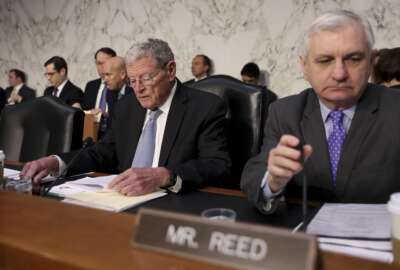

The Marines will rethink their bonus structure and promotion system.
Best listening experience is on Chrome, Firefox or Safari. Subscribe to Federal Drive’s daily audio interviews on Apple Podcasts or PodcastOne.
The new commandant of the Marine Corps is calling for a “period of substantive change” as the service prepares for more action in the Pacific arena and expects heavy demands on the nation’s naval services.
Marine Corps Commandant Gen. David Berger is prioritizing force design and signaling major personnel changes during and after his tenure in his recently published planning guidance.
“We are entering a period of force transformation,” Berger said in the guidance. “While this transformation will require more than simply the next four years, as maneuverists we are prepared to make bold decisions more rapidly than others to effect those outcomes, to generate tempo, and create friction within the decision cycles of our competitors and adversaries … As we implement the guidance in this document, we must divest of the past to modernize for the future.”
Berger states that the top priority in the document is force design and that he is personally leading the effort for what the future force design will look like.
What it means, though, is modernization over expansion.
“We will divest of legacy defense programs and force structure that support legacy capabilities,” Berger states. “If provided the opportunity to secure additional modernization dollars in exchange for force structure, I am prepared to do so.”
The III Marine Expeditionary Force (MEF) will become the Corps’ main focus of effort. The III MEF is honed in on the Pacific region.
“III MEF will be a credible deterrent to adversary aggression in the Pacific,” Berger said. “It is designed to provide U.S. Indo-Pacific Command and the commander [of] 7th Fleet with a fight-tonight, stand in force capability to persist inside an adversary’s weapon systems threat range, create a mutually contested space, and facilitate the larger naval campaign.”
Berger’s guidance also puts a heavy emphasis on changing the way the Marine Corps addresses personnel issues.
Berger calls out the current manpower model as based on producing mass over quality. The guidance calls for the Marine Corps to consider up to one-year leaves-of-absence for mothers to remain with their children before returning to service.
The guidance also looks at how the Corps retains, recruits and promotes Marines.
Berger states that the Marines currently look at time and experience, rather than talent, performance or future potential.
“While performance is factored into promotion selection, it is narrowed to a slim cohort, roughly based on year groups — an antiquated model,” the guidance states.
The guidance suggests advancing Marines more quickly based on need and gaining more tools to recruit Marines with needed skills.
Berger also wants the Marine Corps to weigh current performance over average performance, to consider letting Marines stay in the service longer than the 20 year mark and to allow them to change career paths as their interests evolve.
“Current policies drive increased permanent change of station costs, throw away talent at the point it is most productive and highly trained, and discourage performers who would like to continue serving, but may be less interested in promotion or constant disruptive moves of questionable personal and professional value,” Berger said.
He also recommends changing the bonus structure away from blocks of occupations and more to target the individuals the service wants to retain. The incentives-based model “should use money like a focused weapon and aim it at the exact individual” the Marine Corps needs.
Berger said that he is willing to trim end-strength in favor of quality and wants to request more modern tools from Congress to compete in the talent marketplace. He added that the changes Congress made to the military personnel system are only modest improvements at this point.
Copyright © 2025 Federal News Network. All rights reserved. This website is not intended for users located within the European Economic Area.
Scott Maucione is a defense reporter for Federal News Network and reports on human capital, workforce and the Defense Department at-large.
Follow @smaucioneWFED



